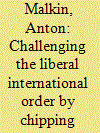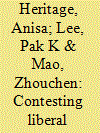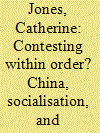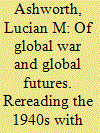| Srl | Item |
| 1 |
ID:
174072


|
|
|
|
|
| Summary/Abstract |
This paper examines China’s investments in Russia as a case study of China’s challenge to the liberal order. It surveys the political economy of China’s state-owned enterprises—the primary vehicles for China’s investments in Russia—in a global context. It argues that China’s investments in Russia constitute an emerging structural economic challenge to the liberal international order. The trend of China’s investments in Russia illustrates Beijing’s strategy of fostering global economic integration that ultimately may not conform to the geopolitical underpinnings of a liberal international order. It looks at two cases of China’s investments in Russia: the technology sector and the financial sector. It shows that the liberal order’s tension with China’s strategy vis-à-vis globalization is rooted in its impact on US structural power and suggests that the active presence of Chinese state-guided capital in Russia’s high-tech development and its financial system illustrate the nature of this challenge.
|
|
|
|
|
|
|
|
|
|
|
|
|
|
|
|
| 2 |
ID:
174070


|
|
|
|
|
| Summary/Abstract |
As the introduction to the special issue on 'Contesting liberal internationalism: China's renegotiation of world order', this paper outlines the theoretical framework of the special issue, namely international order and order contestation, and the main arguments of the four papers included in this special issue. Recently, a, albeit not the, key challenge to the liberal international order stems from the leadership aspirations of non-Western, non-liberal states, and their increasing demand for a greater voice, most notably China under the leadership of Xi Jinping. This special issue is constructed as a debate concerning the alleged challenges posed by China to both the political and economic spheres of the liberal international order. The four case studies and papers are grouped into two core themes: the impact of China's state-capitalist development model and practices on the liberal economic order, and China's attempts to transform norms and rules in security-related matters. The four papers aim to appraise Chinese discursive narratives and practices that would collectively challenge American liberal hegemony. Altogether they argue that a hybrid of order-building norms and practices is likely to co-exist alongside the prevailing liberal international order.
|
|
|
|
|
|
|
|
|
|
|
|
|
|
|
|
| 3 |
ID:
174073


|
|
|
|
|
| Summary/Abstract |
Debates on China’s engagement with international institutions centre on a (false) dichotomy that China is either a status-quo or revisionist power. Both sides of this debate have ample empirical evidence to support their arguments and they tend towards conclusions that China’s behaviour and preferences lie in the space in between these two positions. It is important to consider how China presents a contest to international order from with international institutions.
|
|
|
|
|
|
|
|
|
|
|
|
|
|
|
|
| 4 |
ID:
174071


|
|
|
|
|
| Summary/Abstract |
Chinese state-owned enterprises (SOEs) have become an important source of foreign direct investment (FDI) in resource-rich countries. Their expansion has stirred a debate in the Western hemisphere about the ability of SOEs to challenge liberal economic practices and to alter domestic governance in the countries where they invest. This paper contributes to this debate by examining the case of Chinese SOE investment in the Canadian hydrocarbon sector. It uses insights from the literature on the world order, international business, and international relations to examine the impact of SOE investment on a host country in the Western hemisphere. As I argue, the Canadian response to SOE’s investment has been on the cautionary side, which opens avenues for institutional innovation that leads to stricter regulations of SOEs’ FDI. As I propose, stricter regulations can be reinterpreted as an attempt to support liberal economic practices, yet may unintentionally have the opposite effect.
|
|
|
|
|
|
|
|
|
|
|
|
|
|
|
|
| 5 |
ID:
174069


|
|
|
|
|
| Summary/Abstract |
Not very far from where I live in St. John’s there is a place called Placentia Bay. It is in this bay on August 1941 that the British Prime Minister Winston Churchill and the US President Franklin Delano Roosevelt met. Although the United States was still formally neutral (and the Soviet Union was not represented, although along with other Allied powers it later agreed to the principles), it was on the rendezvousing warships that the two leaders and their aides came up with a set of Allied war aims that would come to be known as the Atlantic Charter. While historians still debate the Charter’s role in the development of Allied war aims, its symbolic role in post-war reconstruction underscore the importance of the ‘trans-war’ period of the 1930s and 1940s for the development of the modern world.
|
|
|
|
|
|
|
|
|
|
|
|
|
|
|
|
| 6 |
ID:
174074


|
|
|
|
|
| Summary/Abstract |
Conventional accounts of the South China Sea territorial disputes identify China’s assertive behaviour as the primary cause of the rising tension since the early 2010s. This paper goes beyond this traditional interpretation of the disputes by arguing that the territorial disputes are an expression of the broader contestation between two order-building projects by China and the United States (US). China’s assertive behaviour originates in its desire to promote a ‘historical’ and ‘post-colonial’ maritime order that is premised on its Sino-centric historical narrative of the Sea and on its emphasis on the historical legitimacy of the regional order of 1943–1945. The US-led ‘liberal’ maritime order is underpinned by a post-war legal framework built on the San Francisco Peace Treaty and the United Nations Convention on the Law of the Sea, and the notion and practice of freedom of navigation. Since October 2015 the US has enhanced its freedom of navigation operations to challenge China’s ‘excessive’ maritime or territorial claims. We conclude that as a result of the uneasy coexistence of these two order-building projects, which fundamentally disagree over the foundations of maritime order in the South China Sea, the disputes have reached an open-ended impasse.
|
|
|
|
|
|
|
|
|
|
|
|
|
|
|
|